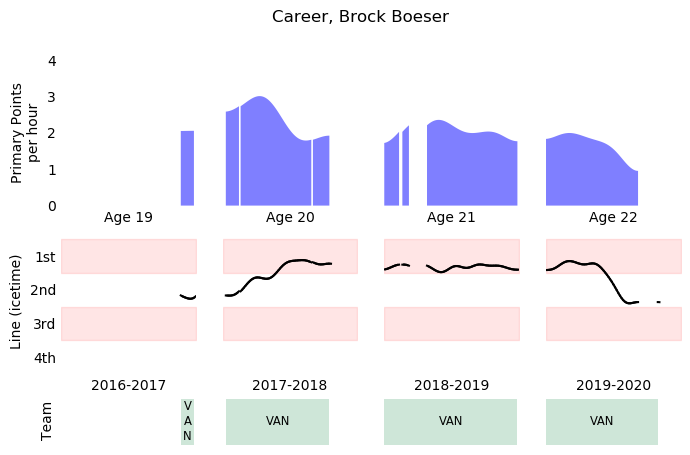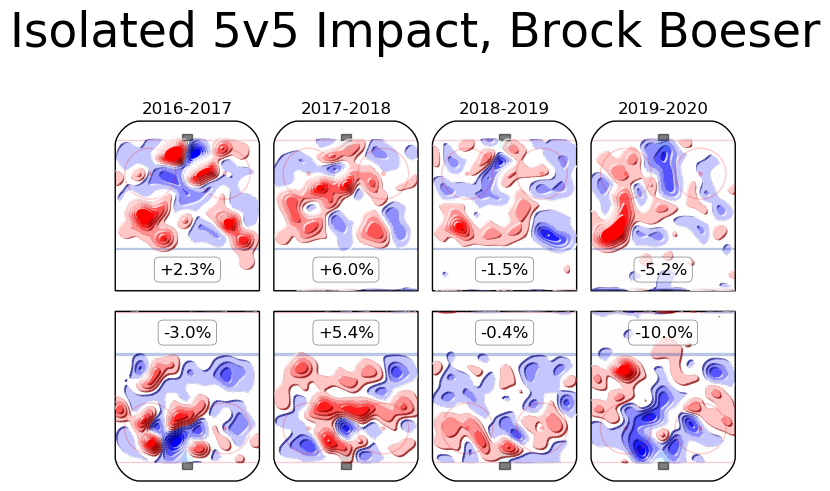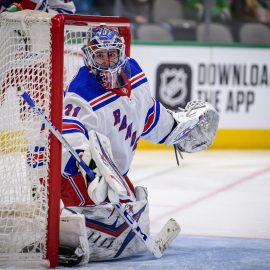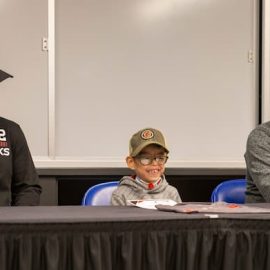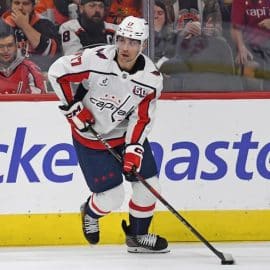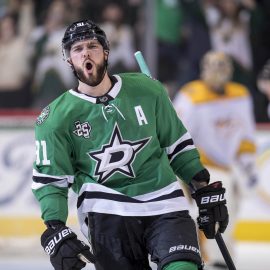https://twitter.com/DhaliwalSports/status/1281698093281542146
According to TSN 1040’s Matt Sekeres, in response to the self-created cap problems that the Vancouver Canucks will be faced with this offseason, the team may be forced to look at moving Brock Boeser’s contract off the books.
Ignoring how hilarious it is that a team can willingly put itself in such a problematic situation because it felt obligated to doll out cash and term to redundant talent like Jay Beagle, Brandon Sutter, Tyler Myers and Loui Eriksson, the question the Ottawa Senators have to ask if Boeser does indeed hit the market is, ‘Should they pursue his availability?’
Obviously Pierre Dorion should perform the necessary due diligence on any prospective young talent who becomes available, but here is what we know about Brock Boeser.
The 23-year old right winger is in the first-year of a three-year contract extension that he signed this past September upon completion of his entry-level contract. His current deal carries an average annual value of $5.875 million, but it will pay him $6.125 million next season ($3.0 million in signing bonus + $3.125 million in base salary) and $7.5 million in total salary without any signing bonuses for the 2021-22 season.
Boeser has played parts of four seasons in the NHL recording 75 goals and 161 points in 197 games.
Arguably, Boeser’s most memorable was his rookie campaign in which he scored 29 goals and 55 points and finished second in Calder Trophy balloting while picking up MVP honours in the 2018 NHL All-Star Game.
Boeser followed with a solid sophomore campaign (25 goals and 56 points in 69 games), but in an injury-marred 2019-20 season, his offensive numbers dipped to 16 goals and 45 points in 57 games.
Despite the dip in counting stats, Boeser actually established a career-best five-on-five production rate in 2019-20.
From NaturalStatTrick.com:
|
Season |
GP | TOI/GP | G/60 | Pts/60 |
| 2017-18 | 62 | 13:51 | 1.26 |
2.09 |
|
2018-19 |
69 | 14:30 | 0.96 | 1.92 |
| 2019-20 | 57 | 13:22 | 0.79 |
2.13 |
Although Boeser’s point rate has improved, it is easy to notice how his rookie goal rate is almost 1.6 times more than his 2019-20 goal rate.
In Vancouver, there have been plenty of theories as to why Boeser’s goal rate has dropped. The theories range from speculation that a wrist injury that he suffered in 2018 sapped him of his greatest offensive trait: his wrist shot.
Whether the injury has hampered Boeser’s shooting can only really be understood by the player or perhaps a few within the organization who better understand his health and performance. What is clear however, is that Boeser is using his wrist shot less than he ever has.
This past January, Pass It To Bulis’ Daniel Wagner published an article contrasting Boeser’s shot data this season against his previous campaigns. (Note: I’ve updated Boeser’s 2019-20 shot rates from the time of Wagner’s article by using NHL.com’s data.)
|
Season |
Shots/GP | Wrist Shots/GP | Snap Shots/GP | Slap Shots/GP |
| 2017-18 | 2.89 | 1.87 | 0.26 |
0.44 |
|
2018-19 |
3.03 | 1.96 | 0.19 | 0.54 |
| 2019-20 | 2.96 | 1.44 | 0.59 |
0.42 |
As the data shows, Boeser’s shot rate has essentially stayed the same, but the volume of snap shots and wrist shots has changed significantly.
Heading into the 2019-20 season, Wagner noted that 42 of Boeser’s 59 goals were scored with a wrist shot (71.2%). Last season, only seven of Boeser’s 16 goals (43.8%) were scored with a wrist shot.
Interestingly, Boeser’s shooting percentage with the wrist shot has diminished as well.
|
Season |
Shooting % w/ Wrist Shot |
|
2017-18 |
16.2 |
| 2018-19 |
12.4 |
| 2019-20 |
9.5 |
Maybe the injury has affected Boeser or maybe teams have emphasized taking away time and space from a player giving him less time to get that wrist shot off.
Or maybe this is simply a case of a player and a team deferring to a much more talented player in Elias Pettersson – especially on the power play as Wagner describes in his article.
In his first season in the league, Boeser played predominantly at five-on-five with Bo Horvat and Sven Baertschi. In his sophomore campaign, he’s spent most of his time lined up beside Pettersson, before playing almost exclusively with Pettersson in 2019-20.
This improvement in his quality of linemates may also help explain how Boeser’s five-on-five points rate this season became the highest of his career.
Using HockeyViz.com’s Isolated Impact visual tools, we can see how Boeser’s offensive and defensive impacts has progressed.
Intriguingly, his primary points rate and offensive impact have diminished over the past two seasons while his two-way game has improved.
For Pierre Dorion, it makes sense to kick tires on Boeser’s availability, but it’s not difficult to see how this deal could go south for the Senators.
Having already played three full seasons with two years left on his current deal, if the Senators pulled the trigger on a deal, that means that they would only have four years of control over Boeser before he’s eligible for unrestricted free agent rights. And at the expiration of his current deal, any qualifying offer to maintain Boeser’s rights would clock in the $7.5 million in base salary that he earned in the last year of his current deal.
There is no question that having Boeser from 23 years of age or more would certainly appeal to the Senators in the sense that he’s a young and talented player who could slide into the team’s top-six today, but when you’re looking at the opportunity cost involved to get a player whose offensive impact has diminished because of injuries, deferring to a more-talented player in Pettersson or some combination of the factors, it is easy to arrive at the conclusion that the deal simply wouldn’t be worth the cost.
The risk of overpaying for a four-year window and having a player leave as an unrestricted free agent is very real.
Despite all the pomp and pageantry about spending to the cap ceiling at some point in the future when the team is closer to contention, Senators fans have heard these promises from ownership and management before only to see star players leave as soon as they became eligible for unrestricted free agency.
Knowing that history and rumours that the owner does not want to spend a lot of money in the short-term, I’m skeptical that they would even consider trying to add a Brock Boeser now – considering the bonus money involved and the eventual qualifying offer it will take to reserve more control over his future.
Boeser’s a good player, but he isn’t a great one. For me, the opportunity risk involved to acquire him coupled with the guarantee that the team only has him under team control for the next four seasons – which may not necessarily align well with this team’s window of contention.
For an organization that does not have the deepest of pocketbooks, it is in the team’s best interests to continue to horde as much good, young talent as possible during their respective seven-year restricted free agent windows to give the organization its best opportunity to win in the future.
Further to the point, if the Senators draft a skilled right winger like Lukas Raymond, for example, to add to another top-six winger in Drake Batherson, is there really even going to be a need for a Boeser in two, three or four years?
To quote Daniel Alfredsson, probably not.
And that is not to knock Boeser’s talent, but it simply does not make sense to throw away a ton of draft pick and prospect capital to acquire a player who probably won’t move the needle much during a time when the team is still patiently building towards a more competitive team. If the Senators are eventually going to move some of that surplus young talent, do it at a time when you have a better read of the upside of this group or even better, wait to do it when a more talented player becomes available and is a better long-term fit for this group.
Boeser’s a different player obviously, but the decision to pull the trigger on this kind of deal would be the same kind of mistake that the organization made when they acquired when they acquired Bobby Ryan.
The Sens would do well to keep on their current path.
Add The Sports Daily to your Google News Feed!
